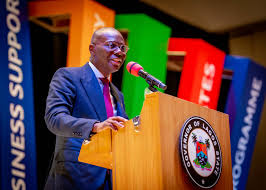Lagos State Governor Babajide Sanwo-Olu announced initiatives aimed at tackling youth unemployment by empowering artisans and tradesmen through skills development. Speaking at a recent graduation ceremony for 1,200 trained artisans and tradesmen, Sanwo-Olu emphasized that Lagos is committed to fostering entrepreneurship to address Nigeria’s high unemployment rates.
“Our goal is to equip Lagos residents with world-class skills to secure well-paying jobs and reduce unemployment,” Sanwo-Olu said. The governor highlighted that the state government has trained over 7,400 artisans, offering support and mentorship to boost their professional skills and enable them to deliver quality services.
In his speech, Sanwo-Olu underscored the changing economic landscape, noting that advancements in technology and shifting consumer demands make skills training essential. “The skills you have acquired will help you stay competitive, adapt to change, and seize new opportunities,” he remarked. “Entrepreneurs are the backbone of the economy, the largest employers of labor, and essential to driving development,” he added.
The eight-week training program, spanning Lagos’s three senatorial districts, provided 800 artisans and 400 tradesmen with both technical and entrepreneurial skills. Trainees are now equipped to compete effectively in the market, enhancing their standard of living while contributing to the state’s economic growth.
Sanwo-Olu also announced an increase in the annual subvention for the Lagos State Council of Tradesmen and Artisans (LASCOTA) from N12 million to N15 million, alongside a new vehicle for the association.
Akinyemi Bankole Ajigbotafe, Lagos’s Commissioner for Wealth Creation and Employment, praised the initiative as a powerful socio-economic intervention. “The upskilling program is designed to make artisans 21st-century compliant, equipping them with essential technical and business skills for a competitive marketplace,” he said, adding that the program aligns with the T.H.E.M.E.S. Plus Agenda, focusing on social inclusion, gender equality, and youth empowerment.
Each graduate will receive modern equipment to support financial sustainability, underscoring the state’s commitment to developing a skilled workforce that will drive Lagos into a new era of progress. The program ran from July 26 to September 22 across three training centers in Agidingbi, Ikotun, and Ikorodu.
This initiative reflects the Lagos government’s dedication to growing and supporting micro, small, and medium enterprises (MSMEs) through skill development, helping the state shape a resilient, competitive workforce.










